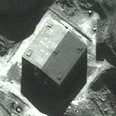
The Syrian reactor prior to the bombing
Photo: AP
IAEA finds new uranium traces at Syria site
UN nuclear agency report says new traces of uranium, graphite found in samples from suspected reactor site bombed by Israel. Agency officials also negate Damascus claim any uranium came from Israeli missiles. Separate IAEA report says Iran has markedly slowed the expansion of it uranium enrichment program
The UN nuclear agency says it has found new traces of uranium in samples taken from a Syrian site being investigated for possible hidden nuclear activities.
The finding is part of a restricted report on Syria being circulated among the International Atomic Energy Agency's 35 board member nations.
The Assad Factor
Associated Press
Senators visit Syria, Kerry says US wants Assad to help with disarmament of Hizbullah
It was the first disclosure that graphite particles had turned up and a senior UN official said the discovery of additional uranium traces was a "significant" find, while stressing an IAEA investigation of Syria remained inconclusive.
Furthermore the IAEA said that the uranium found at the site is unlikely to have come from Israeli missiles that bombed it.
The IAEA wrote in a restricted report obtained by AFP that its "current assessment is that there is a low probability that the uranium was introduced by the use of missiles."
Syria has alleged that particles of uranium found at a remote desert site which the United States alleges was a covert nuclear reactor came from the Israeli bombs that razed the site in September 2007.
Meanwhile a separate report on Iran being circulated Thursday notes that Iran has considerably slowed down the expansion of its contested uranium enrichment program. The IAEA said Iran had increased the number of centrifuges refining uranium, a process that can produce fuel for civilian energy or potentially for
atom bombs, by only 164 from 3,800 in November, an insignificant change.
The report also said Iran had refused to let IAEA inspectors conduct a design check at its Arak heavy water reactor project in January and had built a dome over it, preventing satellites
from taking images of the facility.
The UN Security Council has slapped sanctions on Iran for not freezing enrichment, which can be used to make both nuclear fuel and the core of warheads.
The Associated Press, Reuters and AFP contributed to this report















